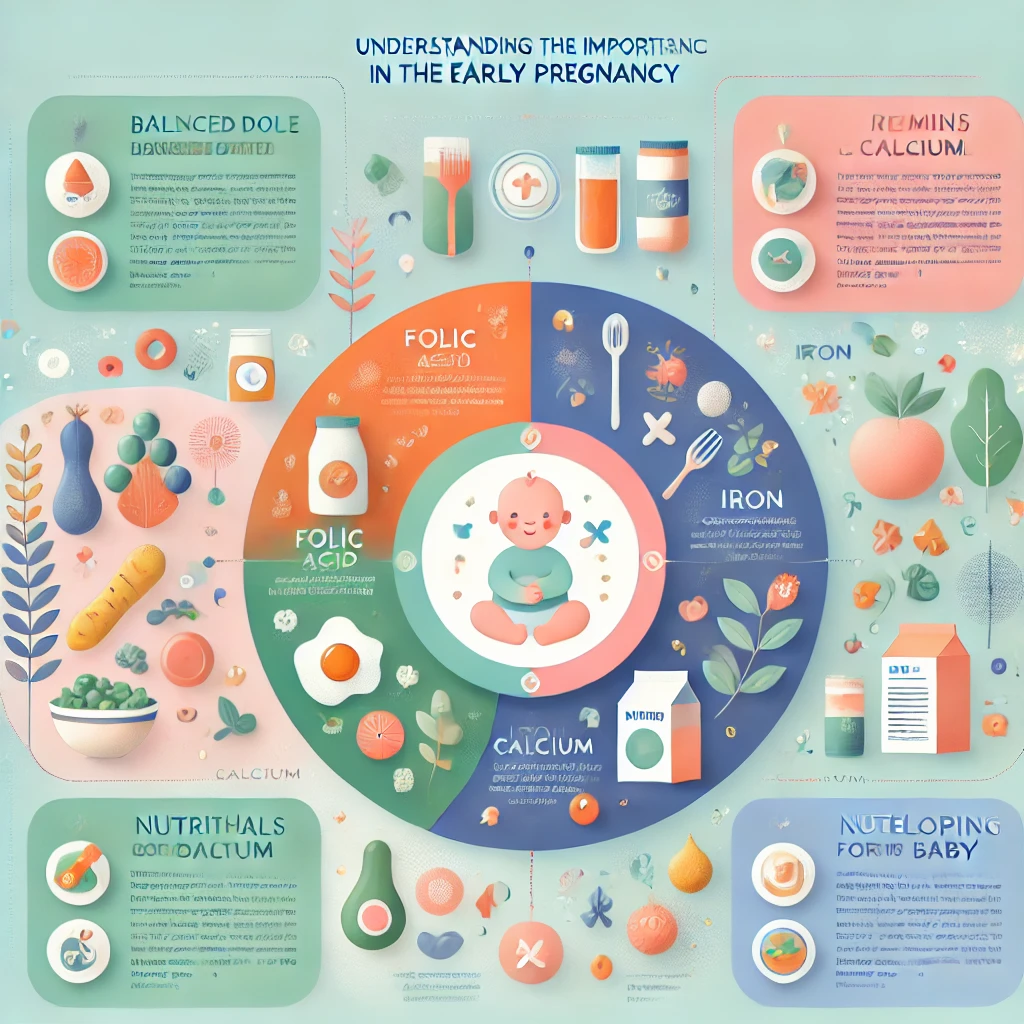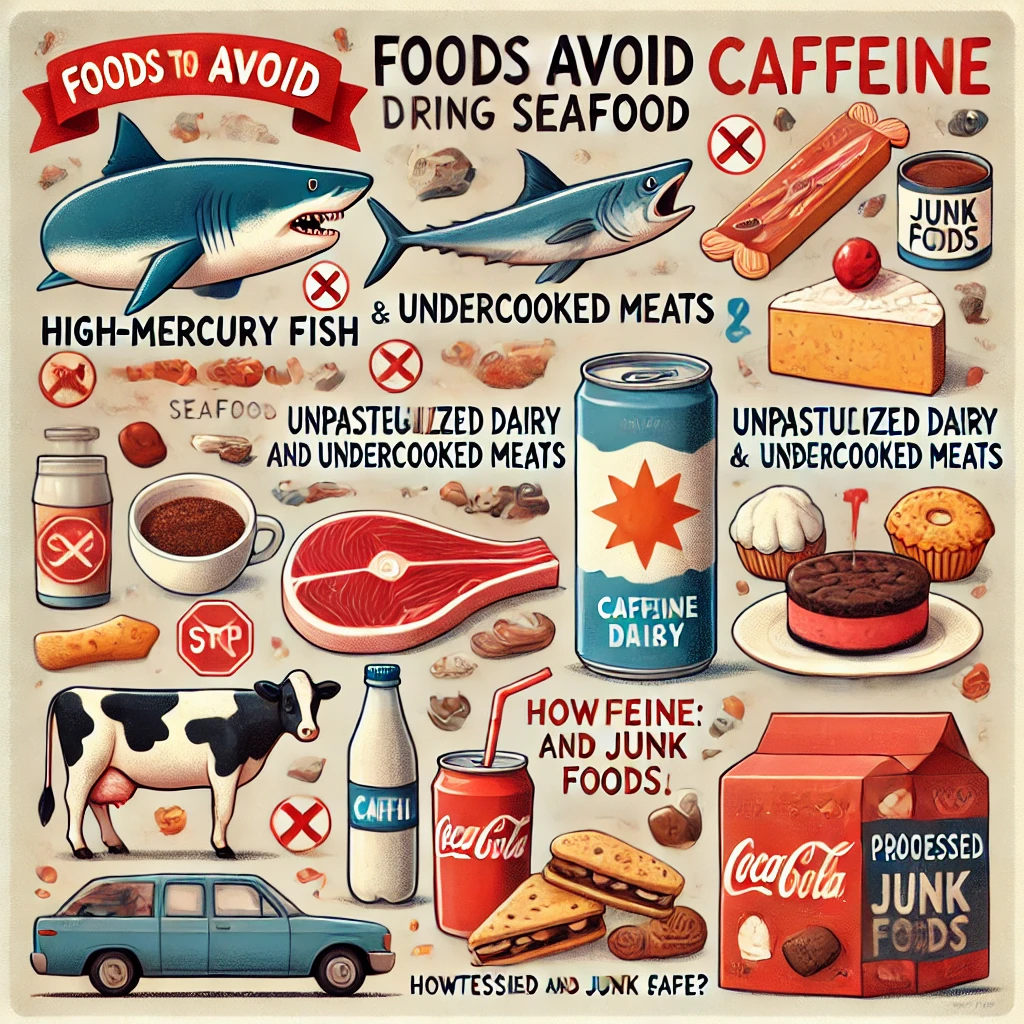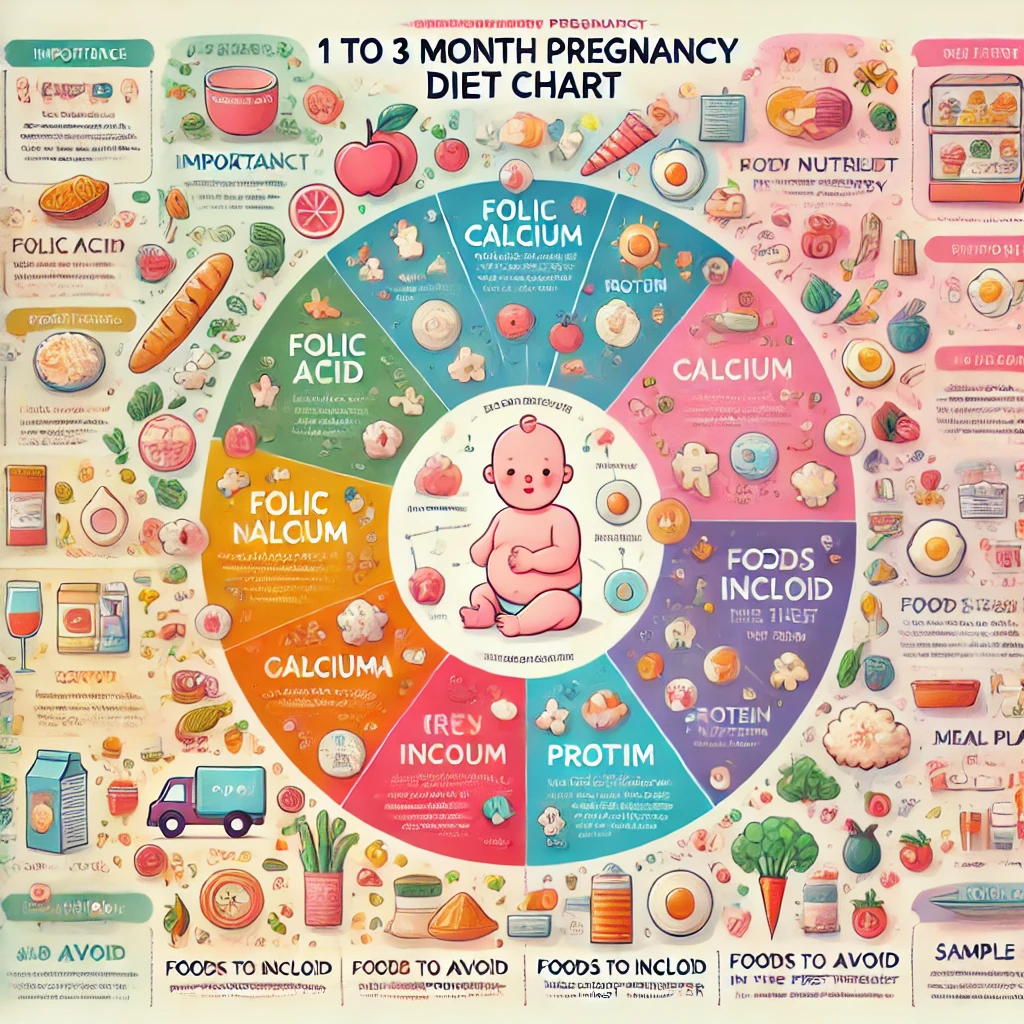The first trimester of pregnancy is a vital phase for your baby’s development, as major growth processes are underway. During this time, your body experiences significant changes to support your baby’s growth, making proper nutrition essential for ensuring both maternal and fetal health. This 1 to 3 month pregnancy diet chart provides a detailed look at essential nutrients, foods to include and avoid, and important lifestyle tips to help make your first trimester healthy and stress-free.
Understanding the Importance of Nutrition in Early Pregnancy

The Role of a Balanced Diet in the First Trimester
During the first trimester, the baby’s vital organs, brain, and neural tube develop at a rapid pace. A balanced diet ensures you get the necessary macronutrients (carbohydrates, proteins, and fats) and micronutrients (vitamins and minerals) to support these processes. Nutritional deficiencies during this stage may increase the risk of complications like birth defects, poor fetal growth, or pregnancy complications.
Your energy needs during the first trimester may not drastically increase, but the quality of your food choices matters more than ever. Eating a variety of nutrient-dense foods will provide the building blocks for your baby’s growth and keep you energized through the early symptoms of pregnancy, such as fatigue and morning sickness.
Nutritional Needs for the Developing Baby
In the early weeks, your baby’s neural tube forms, which later develops into the brain and spinal cord. This development relies heavily on nutrients like folic acid, iron, and DHA (a type of omega-3 fatty acid). Proper nutrition also strengthens your placenta, the organ responsible for delivering oxygen and nutrients to the baby. Maintaining a balanced diet lays the foundation for your baby’s growth and reduces the risk of complications like gestational diabetes or low birth weight.
Key Nutrients Essential for Early Pregnancy
Folic Acid: A Vital Nutrient for Neural Development
Folic acid is perhaps the most important nutrient during the first trimester. It helps prevent neural tube defects, such as spina bifida, which can occur early in pregnancy. The recommended daily intake of folic acid is 400-800 micrograms. You can get this from prenatal vitamins and foods like spinach, broccoli, fortified cereals, and oranges. Even before conception, many healthcare providers recommend folic acid supplementation to ensure adequate levels from the start.
Iron and Its Role in Preventing Anemia
Iron is critical for producing hemoglobin, the protein in red blood cells that carries oxygen to your baby. Pregnancy increases your blood volume by up to 50%, so your iron requirements also rise. Consuming iron-rich foods like red meat, lentils, spinach, and fortified grains can prevent anemia, which is linked to fatigue and preterm delivery. Pair iron-rich foods with vitamin C sources like citrus fruits to enhance absorption.
Calcium and Vitamin D for Bone Development
Your baby’s bones and teeth start forming as early as the first trimester, making calcium and vitamin D essential nutrients. Pregnant women should aim for 1,000 mg of calcium and 600 IU of vitamin D daily. Good sources include dairy products, fortified plant milks, tofu, and almonds. Spending time in sunlight can also help maintain optimal vitamin D levels.
Protein: Building Blocks for Your Baby
Protein supports tissue growth and repair for both you and your baby. Aim for at least 60 grams of protein per day, which you can get from lean meats, fish, eggs, dairy, and plant-based sources like beans, lentils, and nuts. Protein-rich snacks like boiled eggs or Greek yogurt can help keep you satisfied between meals.
Omega-3 Fatty Acids for Brain Development
DHA, a type of omega-3 fatty acid, plays a significant role in your baby’s brain and eye development. Fatty fish like salmon, walnuts, chia seeds, and flaxseeds are excellent sources. If you don’t consume fish, consider an omega-3 supplement after consulting your doctor.
Foods to Include in Your First Trimester Diet
Fruits Rich in Vitamins and Antioxidants
Fruits like oranges, bananas, apples, and berries are rich in essential vitamins, fiber, and antioxidants. Vitamin C from citrus fruits supports iron absorption, while bananas provide potassium to help manage pregnancy-related muscle cramps. Apples and berries are also packed with fiber to aid digestion.
Vegetables Packed with Essential Nutrients
Leafy greens like spinach, kale, and Swiss chard are powerhouses of folate, iron, and calcium. Cruciferous vegetables like broccoli and cauliflower provide fiber and vitamin C. Sweet potatoes, rich in beta-carotene, support the baby’s cell and tissue development. Make sure to wash vegetables thoroughly to reduce the risk of contamination.
Whole Grains for Sustained Energy
Whole grains like quinoa, oats, and brown rice are excellent sources of complex carbohydrates, fiber, and B vitamins. These foods provide long-lasting energy and help regulate blood sugar levels, which can prevent spikes and crashes that lead to fatigue.
Protein Sources: Meat, Dairy, and Plant-Based Options
Lean meats like chicken and turkey are great sources of protein and iron. Dairy products like milk, cheese, and yogurt offer calcium and probiotics for gut health. For plant-based options, try lentils, chickpeas, tofu, and edamame, which are versatile and nutrient-dense.
Foods to Avoid During Early Pregnancy

High-Mercury Fish and Seafood
Avoid fish like shark, swordfish, king mackerel, and tilefish, as they contain high levels of mercury, which can harm your baby’s developing nervous system. Opt for safer options like salmon, sardines, and shrimp, but limit consumption to 2–3 servings per week.
Unpasteurized Dairy and Undercooked Meats
Unpasteurized milk and cheeses can harbor harmful bacteria like listeria, which poses a serious risk during pregnancy. Similarly, avoid undercooked or raw meats to reduce the risk of foodborne illnesses like toxoplasmosis and salmonella.
Caffeine: How Much Is Safe?
While moderate caffeine intake is generally safe, limit yourself to 200 mg per day (roughly one 12-ounce cup of coffee). Excessive caffeine consumption can increase the risk of miscarriage or low birth weight.
Processed and Junk Foods
Foods high in sugar, unhealthy fats, and sodium offer little nutritional value and can lead to unnecessary weight gain or complications like gestational diabetes. Focus on whole, minimally processed foods for a healthier pregnancy.
Sample Diet Chart for the First Trimester
Morning Meal Options
- A smoothie made with spinach, banana, almond milk, and a handful of nuts
- Whole-grain toast topped with avocado and boiled eggs
Mid-Morning Snack
- Greek yogurt with fresh berries and a drizzle of honey
- A handful of almonds or walnuts
Lunch Ideas
- Grilled chicken salad with mixed greens, cherry tomatoes, and olive oil dressing
- Brown rice with lentil curry and steamed broccoli
Afternoon Snack
- A piece of fruit like an apple or pear paired with a slice of cheese
- Hummus with carrot and cucumber sticks
Dinner Suggestions
- Baked salmon with roasted sweet potatoes and asparagus
- Stir-fried tofu with quinoa and sautéed vegetables
Bedtime Snack
- A glass of warm milk with a pinch of turmeric
- A small handful of trail mix with dried fruits and nuts
Managing Common First-Trimester Symptoms Through Diet
Foods to Combat Nausea and Morning Sickness
Morning sickness is a common complaint during the first trimester. Eating small, frequent meals can help. Ginger tea, plain crackers, and bananas are gentle on the stomach and can alleviate nausea.
Tackling Constipation with Fiber-Rich Foods
Constipation is another common issue due to hormonal changes. Whole grains, fruits, and vegetables provide fiber, while adequate water intake ensures smooth digestion. Aim for at least 25–30 grams of fiber daily.
Keeping Hydrated to Avoid Fatigue
Dehydration can contribute to fatigue, so aim to drink 8–10 glasses of water per day. Add slices of lemon or cucumber to your water for flavor. Electrolyte-rich drinks like coconut water can also help.
Lifestyle Tips to Complement Your Diet
The Importance of Prenatal Vitamins
Even with a balanced diet, prenatal vitamins ensure you’re meeting all your nutritional needs. These supplements typically include folic acid, iron, calcium, and DHA. Consult your doctor to find the right prenatal vitamin for you.
Staying Active During Early Pregnancy
Light exercises like walking, prenatal yoga, and swimming improve circulation and reduce stress. Avoid high-impact activities and listen to your body. Exercise also helps with digestion and energy levels.
The Role of Adequate Rest and Sleep
Pregnancy can be exhausting, especially in the first trimester. Aim for 7–9 hours of sleep each night and take short naps if needed. Proper rest supports your body’s recovery and energy levels.
Monitoring Your Weight and Health in Early Pregnancy
Healthy Weight Gain in the First Trimester
Weight gain is usually minimal during the first trimester, typically 1–4 pounds. Focus on nutrient-dense foods to ensure healthy weight gain while meeting your baby’s developmental needs.
Recognizing Signs of Nutritional Deficiencies
Watch for symptoms like extreme fatigue, dizziness, or brittle nails, which may indicate deficiencies. Regular checkups and blood tests can identify any issues, allowing your doctor to adjust your diet or recommend supplements.
Conclusion
The first trimester is a time of rapid growth and development for your baby, and a well-balanced diet is your greatest ally. By focusing on nutrient-rich foods, staying hydrated, and avoiding harmful substances, you can set the stage for a healthy pregnancy. Always consult your healthcare provider for personalized advice and adjustments to your diet plan.
FAQs
1. What are the best snacks for early pregnancy?
Healthy snacks include nuts, fresh fruit, yogurt, and whole-grain crackers to provide energy and essential nutrients.
2. How can I reduce morning sickness naturally?
Eating small, frequent meals and incorporating ginger, crackers, or bananas can help reduce nausea.
3. Can I take herbal teas during pregnancy?
Some herbal teas are safe, but consult your doctor as certain herbs may not be suitable during pregnancy.
4. What is the ideal daily calorie intake during the first trimester?
You generally don’t need extra calories in the first trimester but focus on nutrient-dense foods within your normal calorie range.
5. Is it safe to eat eggs during pregnancy?
Yes, as long as they are fully cooked to reduce the risk of salmonella.



